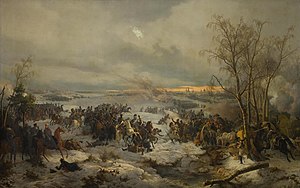The Battle of Krasnoi (at Krasny or Krasnoe) unfolded from 15 to 18 November 1812 marking a critical episode in Napoleon's arduous retreat from Moscow.[12] Over the course of six skirmishes the Russian forces under field marshal Kutuzov inflicted significant blows upon the remnants of the Grande Armée, already severely weakened by attrition warfare.[13][14] These confrontations, though not escalated into full-scale battles, led to substantial losses for the French due to their depleted weapons and horses.[15]
Throughout the four days of combat, Napoleon attempted to rush his troops, stretched out in a 30 mi (48 km) march, past the parallel-positioned Russian forces along the high road. Despite the Russian army's superiority in horse and manpower, Kutuzov hesitated to launch a full offensive, according to Mikhail Pokrovsky fearing the risks associated with facing Napoleon head-on.[16][17] Instead, he hoped that hunger, cold and decay in discipline would ultimately wear down the French forces.[18][19][a] This strategy, however, led him in a nearly perpendicular course, placing him amidst of the separated French corps.[22]
On 17 November a pivotal moment occurred when the French Imperial Guard executed an aggressive feint. This maneuver prompted Kutuzov to delay what could have been a decisive final assault,[12] leading him to seek support from both his left and right flanks. This strategic decision allowed Napoleon to successfully withdraw Davout and his corps but it also led to his immediate retreat before the Russians could capture Krasny or block his escape route.[23] Kutusow opted not to commit his entire force against his adversary but instead chose to pursue the French relentlessly, employing both large and small detachments to continually harass and weaken the French army.[24]
Overall, the Battle of Krasnoi inflicted devastating losses upon the French forces, amplifying their already continuous losses during their perilous retreat. Despite the valiant efforts of the Imperial Guard, the confrontation left the French military in dire straits and without supplies and food, further weakening their already battered army.[14][13]
- ^ Chandler, David (1966). The Campaigns of Napoleon. Weidenfeld and Nicolson. p. 828. ISBN 978-0025236608. Retrieved 22 August 2023.
- ^ Riehn, pp. 344–345.
- ^ a b c Cite error: The named reference
riehn351was invoked but never defined (see the help page). - ^ Georges de Chambray (1825) Histoire de l'expédition de Russie: avec un atlas et trois vignettes, Volume 2, p. 434
- ^ Wilson, p. 266
- ^ Lieven, p. 268.
- ^ Riehn, p. 359
- ^ Bogdanovich, p. 136
- ^ Foord, p. 343
- ^ Manuscript of 1812 Baron Fain
- ^ Foord, p. 348; the Russians claim 2,000 losses.
- ^ a b Lieven, p. 267.
- ^ a b Foord, p. 343.
- ^ a b Lieven, pp. 267–268.
- ^ Mémoires militaires du lieutenant général comte Roguet, p. 513
- ^ Smith, pp. 201–203
- ^ "М. Н. Покровский о войне 1812 года". 17 August 1938.
- ^ Mémoires militaires du lieutenant général comte Roguet, p. 512-513
- ^ Bogdanovich, p. 137-138
- ^ Roguet, comte François (7 August 1865). "Mémoires militaires du lieutenant général comte Roguet (François) ..." J. Dumaine – via Google Books, p. 526.
- ^ "Lettres sur la guerre de Russie en 1812; sur la ville de Saint-Pétersbourg, les moeurs et les usages des habitants de la Russie et de la Pologne". ÖNB Digital.
- ^ Antoine-Henri Jomini (1838) The Art of War, p. 235
- ^ Zamoyski, A. (2004) 1812: Napoleon's fatal march on Moscow, p. 422, 427
- ^ Clausewitz, p. 212, 214
Cite error: There are <ref group=lower-alpha> tags or {{efn}} templates on this page, but the references will not show without a {{reflist|group=lower-alpha}} template or {{notelist}} template (see the help page).
